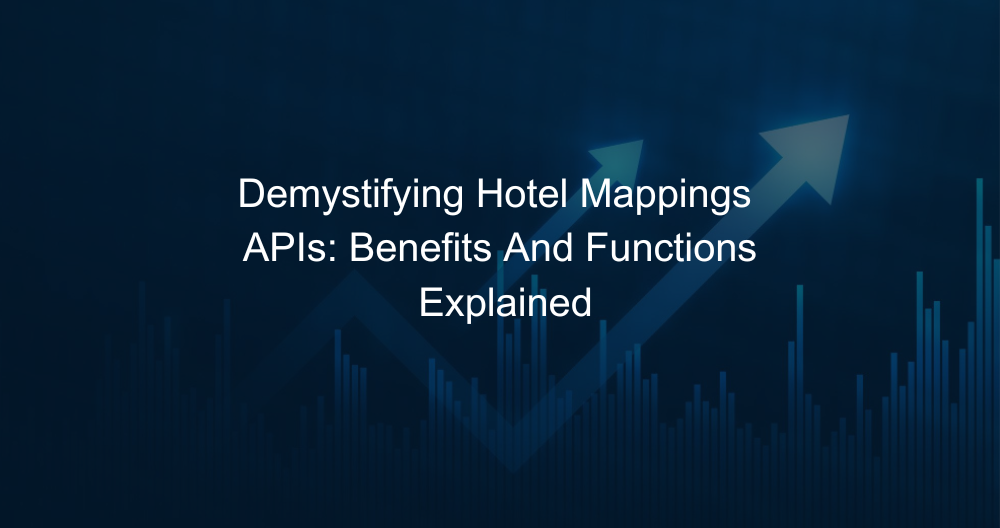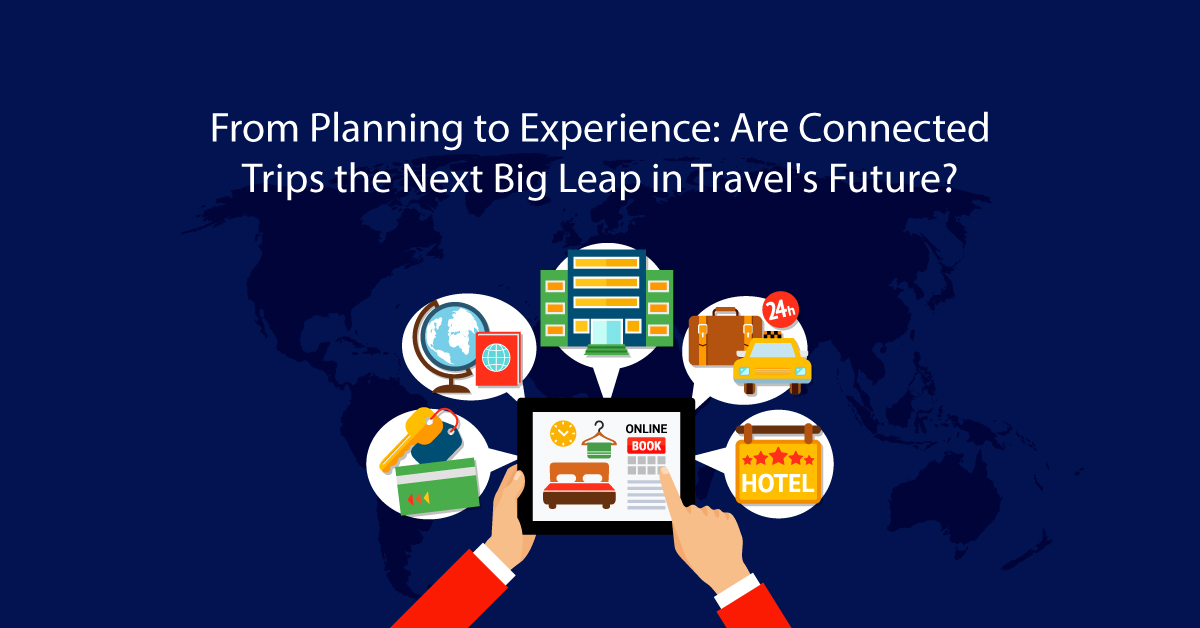The world of online travel has undergone a significant transformation over the last decade. The value of the online travel industry today pegs at 350 billion USD and is expected to reach 1835.6 billion by the end of the decade. The market’s rise also coincided with the rise of online travel agencies (OTAs) worldwide for obvious reasons. And, OTAs heavily rely on suppliers, bed banks, and other third-party providers to cater to this ever-increasing market and provide competitive accommodation products to travelers. All these transactions of accommodation data between providers and travel agencies happen using technology, particularly APIs. However, this dissemination of hotel data from multiple providers to travel agencies is also prone to errors and inconsistencies. That’s when hotel mapping APIs play a crucial role in ensuring that hotel data is accurate and up to date.
Mapping APIs help to standardize hotel data across different platforms, making it easier for travel companies to access and use this information. One of the key benefits of mapping APIs is that they help to reduce the risk of errors and discrepancies in hotel data. This is particularly important when it comes to managing the hotel inventory, as even small errors can have a significant impact on a customer’s booking experience. By using mapping APIs to standardize hotel data, travel companies can ensure that their customers have access to accurate and reliable information. By automating the process of updating and standardizing hotel data, mapping APIs can help to reduce the amount of time and resources required to manage this information. This can be especially valuable for travel companies that need to manage large volumes of hotel inventory data.
These APIs work by aggregating hotel information from various sources and mapping it together to eliminate duplicates and inconsistencies.
The APIs use sophisticated AI algorithms and machine learning to match similar hotel properties based on their features, amenities, and location. This means that when a customer searches for a hotel through an OTA or travel agency, the mapping API takes the search terms and returns results that are accurately mapped to the hotel’s actual data. This helps in creating a seamless customer experience by reducing the likelihood of incorrect or inconsistent data.
One of the most important features of hotel mapping APIs is their ability to standardize hotel data without relying on source. This means that the APIs can take data from multiple sources, such as bed banks, suppliers, and other big travel agencies, and standardize it into a single format. This makes it easier for customers to compare hotels and make informed decisions.
Another benefit of hotel mapping APIs is their ability to provide real-time data. This means that the APIs can quickly update hotel information as soon as providers update them, to ensure travel agencies can provide customers with the most accurate and up-to-date information in real time.
The benefits of hotel mapping APIs go beyond minimizing errors and discrepancies. Here are some of the key benefits of using hotel mapping APIs:
Improved search functionality
Hotel mapping APIs help to create more accurate and streamlined search functionality by consolidating data from multiple sources and standardizing the information. This results in better search results for customers, leading to more bookings and greater customer satisfaction.
For example, imagine a traveler searching for a hotel in New York City. Without hotel mapping, the search results may include duplicate listings for the same hotel, or different listings for the same hotel chain. This can be confusing and frustrating for the customer. However, with hotel mapping, the search results are more accurate and relevant, making it easier for the customer to find the right hotel for their needs.
Increased efficiency
By using a mapping API, hotels and travel companies can avoid manual updates and changes to their inventory, which can be time-consuming and prone to errors. With an API, hotel data can be automatically updated and synchronized across different systems and channels, saving time and reducing the risk of errors.
For instance, imagine a hotel that has recently renovated its rooms and wants to update its online inventory to reflect the changes. Without a mapping API, the hotel would need to manually update its inventory on each online travel agency (OTA) and its own website. This process can be time-consuming and prone to errors, such as forgetting to update a particular OTA. However, with a mapping API, the hotel can update its inventory in one place, and the changes are automatically synchronized across all channels.
Reduced costs
An effective mapping API can decrease operational costs for hotels and travel companies. With accurate and standardized data, travel companies can avoid the costs associated with rectifying incorrect bookings and customer complaints, while hotels can reduce the resources required to maintain inventory and room data.
For example, imagine a hotel that has different room types with different amenities, such as a standard room, a deluxe room, and a suite. Without hotel mapping, the hotel may have different names for the same room type across different channels, such as “standard room” on its website and “classic room” on an OTA. This can lead to confusion for customers and result in incorrect bookings and complaints. However, with hotel mapping, the room types are standardized across all channels, reducing the risk of errors and associated costs.
It is important for hotels and travel companies to choose the right hotel mapping API to ensure effective organization and mapping of hotel data. A good hotel mapping API should provide accurate and reliable data, be easy to integrate with existing systems, and offer customizable search options.
One example of a reliable hotel mapping API is the Vervotech Hotel Mapping API. It is a comprehensive solution that helps travel companies improve and standardize hotel data, along with providing customizable search options to enhance the customer experience. The Vervotech Hotel Mapping API has been widely adopted by some of the largest travel companies in the world, and it has helped them streamline their operations and deliver improved booking experiences for customers.
The Vervotech Hotel Mapping API is a revolutionary technology that has transformed the way hotel data is managed. With its advanced AI and machine learning algorithms, it has become the go-to solution for travel companies looking to improve their search results and provide a better customer experience.
One of the key benefits of the Vervotech Hotel Mapping API is its highly efficient mapping process. It can quickly map hotel data with 99.99 percent accuracy and over 98% coverage, which means that travel companies can provide their customers with up-to-date and relevant information about hotels in real time.
The Vervotech Hotel Mapping API is also designed to be easy to use. It can be integrated seamlessly into existing travel platforms, making it a hassle-free solution for travel companies looking to enhance their offerings.
Hotel mapping APIs have revolutionized the way hotels and travel companies manage their data and improve the search functionality of their online platforms. The use of mapping APIs, like the Vervotech Hotel Mapping API, can help streamline operations, reduce costs, and improve the overall customer experience. As the travel industry continues to evolve rapidly, hotel mapping APIs are increasingly becoming a must have tool for hotels and travel companies to stay competitive in the market.
Vervotech is a leading Hotel Mapping and Room Mapping API that leverages the power of AI and ML to quickly and accurately identify each property listing through the verification of multiple parameters. With One of the industry’s best coverage of 98% and an accuracy of 99.999%, Vervotech is quickly becoming the mapping software of choice for all leading global companies operating in the travel and hospitality industry. To learn more about Vervotech and the ways it can enhance your business in the long run contact us: sales@vervotech.com






